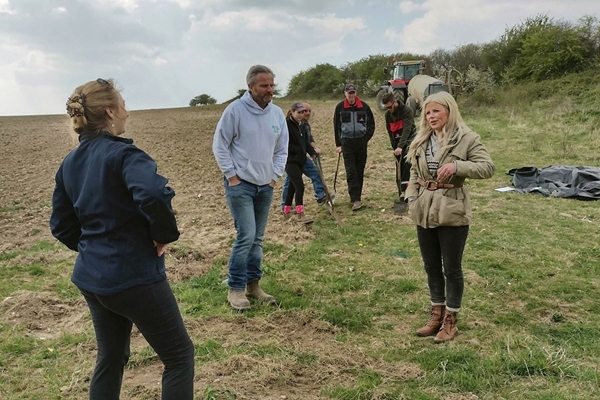Leading UK conservation science charity the Game & Wildlife Conservation Trust recently invited BBC Countryfile to visit three farms on the Hampshire/Dorset border to see farmer-led conservation in action. The Countryfile episode will be broadcast at 6pm on Sunday 9 May.
 Jess Brooks (GWCT) with Countryfile’s Ellie Harrison and farmer
Jess Brooks (GWCT) with Countryfile’s Ellie Harrison and farmer
Rob Shepherd and team preparing to dig a turtle dove puddle.
The farms that hosted the BBC team are part of the Martin Down ‘supercluster’ – a unique collaboration of three ‘Farmer Clusters’ made up of 46 farms, which together cover 236km2 of the Cranborne Chase area of Dorset, Hampshire and Wiltshire, surrounding the famous wildlife-rich Martin Down National Nature Reserve.
Farmer Clusters are groups of neighbouring farmers who work together to deliver benefits for soil, water and wildlife at a landscape scale. They are supported by an advisor/facilitator but set their own agenda and conservation priorities. More than 150 Farmer Clusters have now been established in the UK.
The Martin Down farmers showcased the Farmer Cluster concept and some of their many conservation achievements for the Countryfile cameras. Lead farmer Tim Palmer explained: “We were delighted to welcome Countryfile to hear about what we’ve been working on at Martin Down with our facilitator, the GWCT’s Jess Brooks. Thanks to the farmers’ own commitment and enthusiasm, it is amazing what we have achieved in four short years. Presenter Ellie Harrison helped one of our farmers create a drinking puddle for one of our priority species, the turtle dove. On another farm, the crew filmed a butterfly bank being sown with kidney vetch to support the rare small blue butterfly.”
The GWCT’s Jess Brooks set out some of the cluster’s achievements to the Countryfile team: “Since 2017 I have been immensely proud to work with the farmers of the Martin Down Farmer Cluster – one of the three farmer clusters which make up the Martin Down ‘supercluster’. They have stabilised turtle dove numbers, doubled the populations of wild grey partridges and corn buntings, and increased butterfly species numbers on their farmland by a third. On these 12 farms alone, we have created over 85 hectares of new wildlife habitat, dozens of new ponds and puddles, and 10km of new hedgerows and beetle banks. This sort of work is being replicated on the other farms within the supercluster and on Farmer Clusters across the UK. It is very rewarding to see how quickly we have made a difference at a landscape scale.”
The Game & Wildlife Conservation Trust has been involved with the Farmer Cluster concept from the start, helping to establish the ground-breaking farmer-led Marlborough Downs Nature Improvement Area project in 2012, and then the first pilots of Farmer Clusters in partnership with Natural England in 2014. The GWCT, along with other rural organisations and advisors, continues to provide support and advice to help new and existing Farmer Clusters.
Notes to editors
The Game & Wildlife Conservation Trust – providing research-led conservation for a thriving countryside. The GWCT is an independent wildlife conservation charity which has carried out scientific research into Britain’s game and wildlife since the 1930s. We advise farmers and landowners on improving wildlife habitats. We employ more than 60 post-doctoral scientists and other research staff with expertise in areas such as birds, insects, mammals, farming, fish and statistics. We undertake our own research as well as projects funded by contract and grant-aid from government and private bodies.
For information, contact:
Eleanor Williams
Telephone: 07592 025476
Email: press@gwct.org.uk